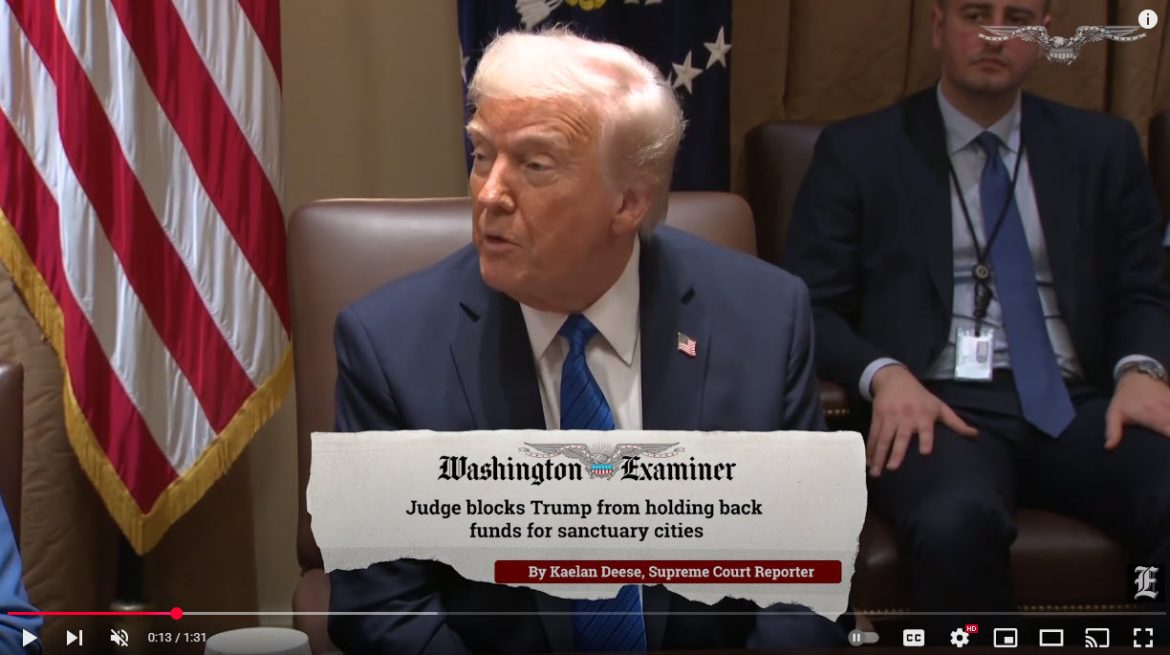A federal judge halts the enforcement of President Donald Trump’s latest executive order targeting sanctuary cities, ruling that the directive is “likely unconstitutional” and exceeds the president’s authority. The decision, issued by U.S. District Judge William Orrick in San Francisco, marks a significant legal blow to Trump’s immigration enforcement agenda and echoes similar rulings from his first term in office.
The order, issued earlier this year, directs U.S. Attorney General Pam Bondi and Homeland Security Secretary Kristi Noem to deny federal funding to jurisdictions that refuse to cooperate with federal immigration authorities—commonly known as “sanctuary cities.” The White House claims the measure is necessary to enhance public safety and national security by compelling cities to assist in the detention and removal of undocumented immigrants.
However, Judge Orrick, an appointee of former President Barack Obama, finds that the executive order likely violates the Constitution by attempting to usurp congressional spending powers and improperly penalize cities without due process. In his ruling, Orrick references a near-identical executive order issued during Trump’s first term, which he also ruled unconstitutional in 2017.
“The Executive Branch cannot use federal funding as a weapon to coerce local jurisdictions into enforcing federal immigration laws,” Orrick writes. “This approach ignores basic principles of federalism and the separation of powers.”
The injunction blocks enforcement of the order in 16 cities and counties that filed suit, including San Francisco, Los Angeles, King County in Washington, Seattle, Minneapolis, St. Paul, Portland, New Haven, and Santa Fe. These jurisdictions argued that the executive order would unlawfully strip them of critical funding for healthcare, public safety, and housing programs simply because of their policies limiting cooperation with U.S. Immigration and Customs Enforcement (ICE).
Attorneys representing the affected cities welcome the ruling as a victory for local governance and constitutional checks and balances. “This is a clear message that the president cannot strong-arm cities into enforcing his immigration agenda,” said San Francisco City Attorney David Chiu. “We will continue to stand up for our communities’ rights to define public safety on our own terms.”
Trump administration officials respond swiftly, vowing to appeal the decision and accusing the court of overreach. “This ruling puts politics ahead of safety,” says Homeland Security Secretary Kristi Noem. “Cities that shield criminal aliens from removal should not be rewarded with taxpayer dollars.”
Attorney General Pam Bondi adds that the administration remains committed to finding legal avenues to enforce compliance with immigration cooperation policies and reduce the number of sanctuary jurisdictions across the country.
The sanctuary city debate has been a flashpoint in American politics for years, with critics of sanctuary policies arguing they allow undocumented immigrants who commit crimes to avoid deportation. Supporters counter that these policies improve community trust in local law enforcement and prevent racial profiling, arguing that immigration enforcement is a federal—not local—responsibility.
This case adds to a growing list of legal defeats for Trump-era immigration initiatives, many of which have been challenged in federal courts over constitutional concerns or administrative overreach. While the Supreme Court has occasionally sided with the administration on immigration matters, including the controversial travel ban, lower courts have consistently pushed back against executive orders that seek to bypass congressional authority.
As the legal battle over sanctuary cities continues, the outcome of this case could have far-reaching implications not only for the future of immigration policy but also for the broader scope of executive power in the U.S. federal system.



